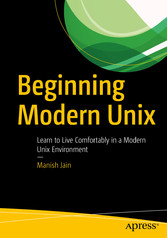Suche
Lesesoftware
Info / Kontakt
Beginning Modern Unix - Learn to Live Comfortably in a Modern Unix Environment
von: Manish Jain
Apress, 2018
ISBN: 9781484235287 , 417 Seiten
Format: PDF
Kopierschutz: Wasserzeichen



Preis: 56,99 EUR
eBook anfordern 





